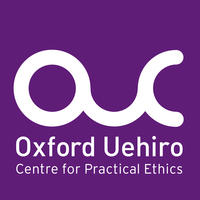About Us

In 2002 the Uehiro Foundation on Ethics and Education, chaired by Mr Eiji Uehiro, established the Uehiro Chair in Practical Ethics at the University of Oxford. The following year, the Oxford Uehiro Centre for Practical Ethics was created within the Philosophy Faculty. Generous support by the Uehiro Foundation enabled the establishment of an annual series of three lectures, The Uehiro Lectures in Practical Ethics.
The goal of the Centre is to encourage and support debate and deeper rational reflection on practical ethics. The Centre as a whole will not promote a particular philosophy, approach, solution or point of view, though its individual members may give an argument to a substantive conclusion as a basis for dialogue, engagement and reflection. It is the method of rational analytic practical ethics that we aim to advance. The vision is Socratic, not missionary. We seek to be inclusive, encouraging debate between different approaches to ethics, aiming to resolve disagreements and identifying key areas of consensus.
Practical ethics should not only advance knowledge by deeper, rational ethical reflection and dialogue, it should change people’s hearts and so better their own lives and the lives of others.
Humanity has flourished and transformed its planet, creating ever more powerful technology with unprecedented potential for great immediate benefit but also for ultimate harm. Its success creates novel problems and challenges, for which its traditional institutions and norms were not developed: climate change, environmental destruction, terrorism, weapons of mass destruction, global inequality and poverty, inter-continental migration and multiculturalism, overuse of antibiotics and the world-wide spread of infectious disease, genetic engineering, and biomedical means of life extension and cognitive and moral enhancement, and artificial intelligence. The fate of humanity in the 21st Century and following centuries will to a greater extent than ever before be determined by the choices made by human beings, the leaders and citizens of nations. It is the values, principles and wider ethics of these people that will determine their choices. We aim to enable practical ethics to develop and more effectively guide human choice.
Oxford Uehiro Centre Ethos and Purpose
The Oxford Uehiro Centre for Practical Ethics is a group of academic researchers in practical (or applied) ethics. We undertake research, teach, and engage with policy and public debates. In all of these, the Centre’s aim is to use, develop, and present philosophical methods in practical ethics. We strive for clarity and precision in our work, and welcome scrutiny and critical discussion of our arguments.
We often differ in the philosophical views we defend. We welcome staff, students, and visitors from a range of different philosophical, religious, and ethical approaches. What we have in common is a commitment to addressing issues in practical ethics through the application of philosophical methods and a commitment to academic freedom: for academics to be able to decide which topics to address and how to approach them.
Practical ethics engages with some of the most sensitive issues that we face as a society, and as individuals. We don’t expect everyone to agree with the arguments that we put forward. Arguments, ideas, and views expressed by individual researchers at the Centre are not those of the Centre itself, and our arguments are not put forward as advocacy or activism. Our aim is to provide an environment where staff, students, and visitors with a variety of views and approaches can engage in constructive debate and collaboration of academic and public value. To achieve this, we expect all of our members to participate in our academic work in a responsible way: by presenting arguments that are well informed, reasoned, and respectful to all involved and affected, and by being open to criticism on the same basis. Likewise, wherever possible, our public engagement materials and events include a mechanism for comment, discussion, and criticism within the bounds of civil discourse.
Link to other relevant statements
University Statement on Freedom of Speech
Department of Politics and International Relations
Media, Consultancy & Policy
Members of the centre are available to provide ethics advice and consultancy for a wide variety of research projects and areas. This includes novel biotechnology, medicine, AI, professional ethics and other areas involving challenging or conflicting ethical considerations. It could include one-off consultation, teaching, written ethical analysis, or commissioning of ethics research.
Please direct enquiries to Liz Sanders.
01865 286928 | liz.sanders@philosophy.ox.ac.uk



